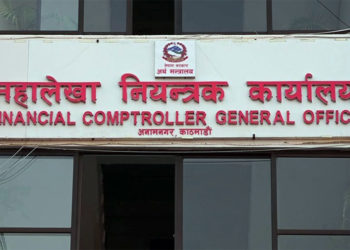KATHMANDU: Economic Digest offers a concise yet comprehensive overview of significant business happenings in Nepal, presented in easily digestible summaries.
The rising international demand for Nepali tea and coffee reflects a significant shift in global consumer preferences, with an increasing appreciation for the unique qualities of these products.
The reported increase in coffee exports to 77 metric tons in the fiscal year 2022-23 is a promising indicator for Nepali exporters looking to tap into international markets.
However, the substantial drop in domestic coffee imports raises questions about local consumption patterns and the overall health of the domestic market, highlighting a need for strategic focus on enhancing local demand to sustain this export momentum.
Additionally, developments in Nepal’s aviation sector, such as Thai Air Asia’s resumption of flights at Tribhuvan International Airport, signal a renewed vitality in the tourism and transport industries, further facilitating the movement of goods, including agricultural exports like tea and coffee.
This synergy between growing international demand for Nepali products and enhanced connectivity through improved air travel could provide a crucial boost to the economy.
Meanwhile, infrastructure advancements, such as the completion of the Chilime-Trishuli 220 kV transmission line, are vital for integrating energy generated from hydropower projects into the national grid, underpinning the country’s broader efforts to promote sustainable energy development.
Additionally, the participation in international platforms like the International Solar Alliance highlights Nepal’s commitment to renewable energy initiatives, positioning the nation to benefit from global trends toward sustainability and energy diversification.
Collectively, these developments illustrate a dynamic interplay of agriculture, aviation, and energy sectors, suggesting a holistic approach to economic growth in Nepal.
Rising international demand for Nepali tea and coffee
The international market is increasingly seeking Nepali tea and coffee.
The rising international demand for Nepali tea and coffee indicates a growing recognition of the quality and uniqueness of these products on a global scale.
According to the National Tea and Coffee Development Board, coffee exports increased to 77 metric tons in the fiscal year 2079-80 BS (2022-23), reflecting a positive trend from the previous year’s 72 metric tons valued at Rs 96 million.
This growth is a promising sign for Nepali exporters as they capitalize on international markets, although the Board is currently compiling data for the 2023-24 fiscal year, which will provide further insights into this trend.
Conversely, the significant decline in coffee imports, which fell from Rs 320 million in 2021-22 to just Rs 100 million the following year, suggests potential challenges in domestic consumption or shifts in market dynamics that need to be addressed to sustain the momentum of exports.
Thai Air Asia resumes flight at TIA
The Thai Air Asia has again started operating flights at Tribhuvan International Airport, Kathmandu.
It had launched commercial flight from Bhairahawa-based Gautam Buddha International Airport (GBIA) from Sunday.
The resumption of flights at Tribhuvan International Airport (TIA) in Kathmandu marks a significant development in Nepal’s aviation sector, especially following its recent launch of commercial services from Gautam Buddha International Airport (GBIA) in Bhairahawa.
As the fourth airline operating at GBIA, Thai Air Asia is positioning itself strategically within Nepal’s expanding international air travel landscape.
The Civil Aviation Authority of Nepal (CAAN) previously sanctioned the airline due to regulatory issues concerning flight permits, necessitating a change in its operational strategy to include flights from GBIA to regain compliance.
The new schedule, which includes regular flights to TIA on Sundays, Mondays, Wednesdays, and Fridays, alongside operations at GBIA on Mondays and Thursdays, not only enhances connectivity for travelers but also signifies a potential recovery for the aviation industry in the post-pandemic era.
This development underscores the importance of regulatory adherence while simultaneously highlighting the growing competition among airlines in Nepal’s evolving market.
Top of Form
Bottom of Form
Construction of Chilime-Trishuli 220 kV transmission line completes
Construction of Chilime-Trishuli 220 kV transmission line has been completed.
This power transmission line is considered significant to supply power to be generated from the under-construction and the upcoming hydropower projects to be constructed along the Trishuli river and its tributaries to the national grid.
This 28-kilometer transmission line stretches from Chilime Hub Sub-Station of Ama Chhodingbo rural municipality in Rasuwa district to Trishuli III B Hub Station of Kispang rural municipality in Nuwakot district.
Executive Director of Nepal Electricity Authority (NEA), Kul Man Ghising, shared that the construction of the transmission line completed after the employees and construction entrepreneurs carried out works even in public holidays of Dashai and Tihar festivals.
Energy Minister participates in 7th Int’l Solar Alliance
Minister for Energy, Water Resources, and Irrigation Deepak Khadka participated in the 7th International Solar Alliance (ISA) that kicked off on Sunday in New Delhi, India.
It may be noted that the International Solar Alliance was declared during the 21st session of the COP-21 held in Paris, France in 2015 during which Heads of States from 120 countries had pledged for their active participation in the alliance to promote solar energy.
(Prepared by Srija Khanal)









Comment